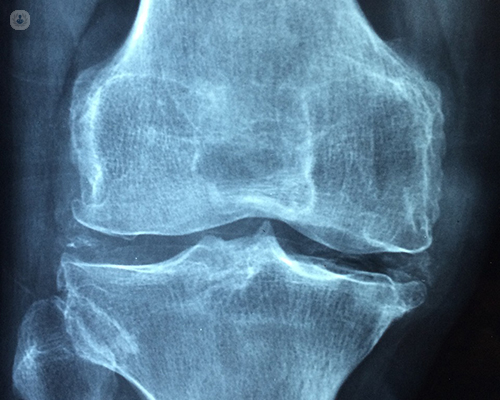Same-day knee replacement: A new approach to surgery
Written in association with:Orthopaedic surgery continually evolves, and innovations like day case knee arthroplasty are changing how knee conditions are managed. This outpatient approach allows patients to undergo knee replacement surgery and return home on the same day, offering convenience, potential cost savings, and faster recovery times. In his latest online article, Mr Shibby Robati aims to outline the practical benefits and considerations of day case knee arthroplasty.

Understanding day case knee arthroplasty:
Day case knee arthroplasty, also known as outpatient knee replacement, involves performing the surgery in a specialised facility where patients can be discharged on the same day. Minimally invasive techniques, regional anaesthesia, and optimised postoperative care pathways contribute to its feasibility.
Key benefits:
Convenience: Patients can avoid overnight hospital stays, minimising disruption to their daily lives and responsibilities. This convenience is particularly valuable for those with limited support at home or obligations they cannot easily delegate.
Faster recovery: Recovering in familiar surroundings can accelerate the healing process and enhance patient comfort. Patients often experience less stress and anxiety when recuperating at home, which may positively impact their overall recovery trajectory.
Cost savings: By reducing the length of hospital stays and resource utilisation, day case knee arthroplasty has the potential to lower healthcare costs. This is beneficial for both patients and healthcare systems, particularly in environments where cost containment is a priority.
Challenges and considerations:
While day case knee arthroplasty offers compelling advantages, several considerations must be addressed:
Patient selection: Not all patients are suitable candidates for outpatient surgery. Factors such as age, overall health, and social support networks must be carefully evaluated to ensure patient safety and optimal outcomes.
Care coordination: Close collaboration between surgical teams, anaesthesia providers, and postoperative care teams is essential to manage patient expectations, mitigate potential complications, and facilitate a smooth transition from the surgical facility to home care.
Risk management: Despite advancements in surgical techniques and anaesthesia, there are inherent risks associated with any surgical procedure. Vigilant monitoring, patient education, and adherence to evidence-based protocols are paramount to minimising complications and ensuring patient safety.
The future of knee arthroplasty:
Day case knee arthroplasty represents a significant advancement in the field of orthopaedic surgery, but its evolution is far from complete. As technology continues to progress and best practices evolve, further refinements in patient selection criteria, surgical techniques, and postoperative care protocols are likely to enhance the feasibility and safety of outpatient knee replacement.
Mr Shibby Robati is an esteemed consultant specialist in complex hip/knee conditions. You can schedule an appointment with Mr Robati on his Top Doctors profile.


